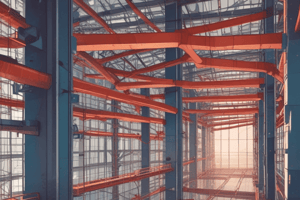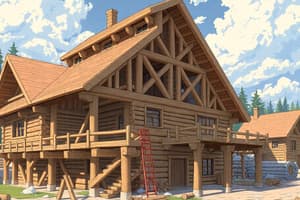Podcast
Questions and Answers
Which of the following is NOT one of the five main types of structures?
Which of the following is NOT one of the five main types of structures?
- Shell
- Beam
- Frame
- Sphere (correct)
A beam is primarily used to support vertical loads.
A beam is primarily used to support vertical loads.
True (A)
Give an example of a shell structure.
Give an example of a shell structure.
Sydney Opera House
A __________ structure spans openings by transferring weight to supports.
A __________ structure spans openings by transferring weight to supports.
Match the following types of forces with their descriptions:
Match the following types of forces with their descriptions:
What is a common example of where tension is found in structures?
What is a common example of where tension is found in structures?
Compression can only act in one direction.
Compression can only act in one direction.
What type of structure is the Millau Viaduct?
What type of structure is the Millau Viaduct?
What is the primary function of triangulation in structures?
What is the primary function of triangulation in structures?
Equilibrium refers to a state where all forces are unbalanced.
Equilibrium refers to a state where all forces are unbalanced.
What does the Factor of Safety (FoS) represent?
What does the Factor of Safety (FoS) represent?
The point where weight is balanced in a structure is called the ______.
The point where weight is balanced in a structure is called the ______.
Match the following terms with their definitions:
Match the following terms with their definitions:
Which of the following is an example of Non-Destructive Testing (NDT)?
Which of the following is an example of Non-Destructive Testing (NDT)?
Flashcards are hidden until you start studying
Study Notes
Types of Structures
- Frame, Shell, Arch, Beam, and Box are the five main types of structures.
Frame Structures
- Comprised of a skeletal framework of beams and columns.
- Example: The Empire State Building.
Shell Structures
- Characterized by thin, curved components that effectively distribute loads.
- Example: Sydney Opera House.
Arch Structures
- Designed to span openings, transferring weight to vertical supports.
- Example: Pont du Gard.
Beam Structures
- Horizontal elements that resist loads from above and transfer them to supports.
Box Structures
- Hollow, rectangular formations often utilized in bridge construction.
- Example: Millau Viaduct.
Forces in Structures
- Force: A push or pull that induces motion or deformation in a structure.
- Load: The force applied to a structure that can cause stress or deformation.
- Five types of forces acting on structures: Tension, Compression, Shear, Torsion, Bending.
Types of Forces
- Tension: Stretches or pulls an object; common in suspension bridges.
- Compression: Squeezes or shortens an object; example: pressing a sponge.
- Shear Force: Causes parts of a material to slide past each other, distinct from tension and compression.
- Torsion: A twisting force; example: twisting a pencil.
- Bending Force: Causes a structure to curve or flex due to a perpendicular force.
Structural Stability
- Equilibrium: A balanced state where all forces are equal, resulting in no movement.
- Centre of Gravity: The point where the weight is balanced; essential for ensuring stability in structural design.
- Triangulation: Strengthens structures by creating rigid frameworks that effectively distribute loads.
Factor of Safety (FoS)
- Defined as the ratio of a structure's maximum strength to the applied load.
- Calculated as ultimate strength divided by working stress.
Load Testing and Quality Assurance
- Load testing involves applying weights to assess a structure’s strength.
- Example: Testing a playground swing set with significant weights.
- Non-Destructive Testing (NDT): Techniques to identify flaws without causing damage to the structure.
- Example: Using a magnet to detect rust.
Studying That Suits You
Use AI to generate personalized quizzes and flashcards to suit your learning preferences.




